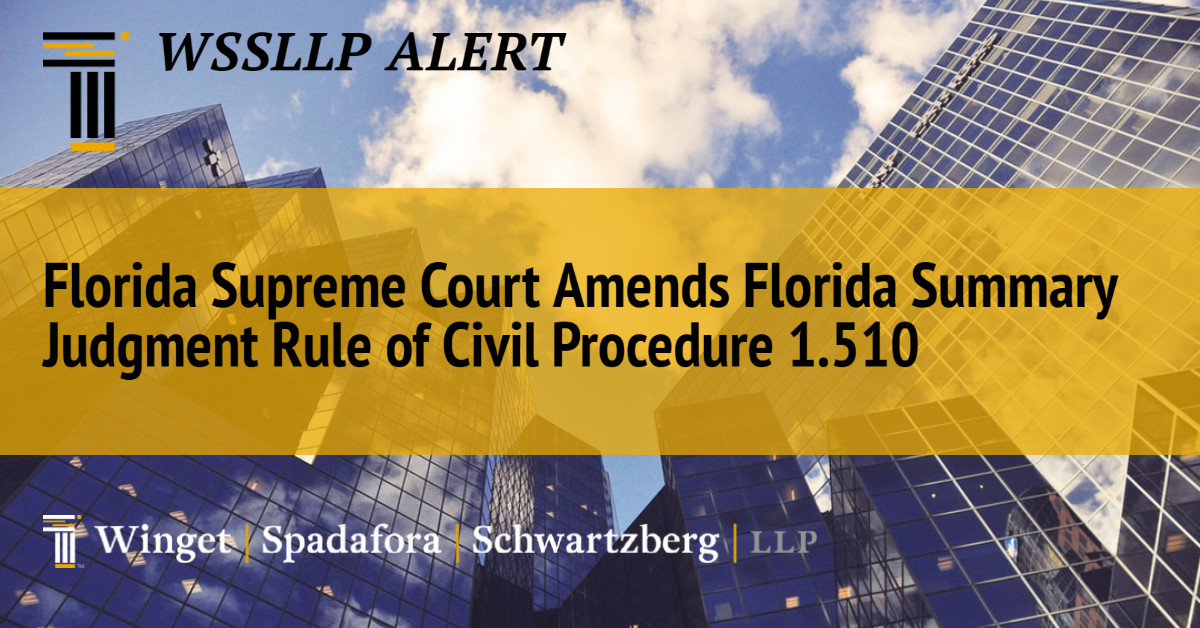On October 15, 2019, the Florida Supreme Court accepted jurisdiction of Lopez, 275 So. 3d 831 (Fla 5th DCA 2019). In addition to accepting jurisdiction of this case, the Court also presented the question of whether Florida should adopt the summary judgment standard articulated by the United States Supreme Court in Celotex Corp. v. Catrett, 477 U.S. 242 (1986), Anderson v. Liberty Lobby Inc., 477 U.S. 242 (1986), and Matsushita Elec. Indus. Co. v. Zenith Radio Corp.
On December 31, 2020, the Florida Supreme Court, in a 6-1 ruling, decided to amend the state standard for determining whether trial courts should grant summary judgment in civil lawsuits. Florida now joins the majority of states in adopting the federal summary judgment standard articulated by the United States Supreme Court in Celotex Corp. v. Catrett, 477 U.S. 242 (1986), Anderson v. Liberty Lobby Inc., 477 U.S. 242 (1986), and Matsushita Elec. Indus. Co. v. Zenith Radio Corp. 475 U.S. 574 (1986).
Currently, Florida Rule of Civil Procedure 1.510 allows for summary judgment if the “evidence on file show that there is no genuine issue as to any material fact and the movant is entitled to judgment as a matter of law.” Under the Florida standard, the moving party has the burden of establishing a record that conclusively disproves the nonmovant’s theory of the case in order to eliminate any issue of fact. Even if the nonmovant does not present evidentiary materials, if the moving party fails to meet its burden the motion for summary judgment must be denied. Florida precedent dictates that if the record reflects even the possibility of a material issue of fact, or if different inferences can be drawn reasonably from the facts, that must be resolved against the moving party and summary judgment must be denied.
In contrast, Rule 56 of the Federal Rules of Civil Procedure allows for summary judgment “if the movant shows that there is no genuine dispute as to any material fact and the movant is entitled to judgment as a matter of law.” In other words, summary judgment is appropriate if the trial court concludes that no reasonable jury could render a verdict in favor of the nonmoving party. As explained in Celotex Corp, “the plain language of Rule 56 mandates that an entry of summary judgment, after adequate time for discovery and upon motion, against a party who fails to make a showing sufficient to establish the existence of an element essential to that party’s case, and on which that party will bear the burden of proof at trial.” In such a situation, there can be “no genuine issue as to any material fact,” since a complete failure of proof concerning an essential element of the nonmoving party’s case necessarily renders all other facts immaterial. The moving party is “entitled to a judgment as a of matter of law” because the nonmoving party has failed to make a sufficient showing on an essential element of its case with respect to which it has the burden of proof. Simply put, unlike the Florida standard, once the moving party meets its initial burden of establishing an absence of material fact, the burden then shifts to the opposing party to provide evidence of their claims, not merely a showing there “is some metaphysical doubt as to the material facts.”
In sum, the adoption of the federal standard will drastically change the Florida summary judgment standard by recognizing the fundamental correlation between a motion for directed verdict and a motion for summary judgment. Although occurring at different procedural points in a lawsuit, these motions serve the same purpose: to test whether a genuine issue of material fact exists that must be resolved by the finder of fact.
The standard will become effective on May 1, 2021 to allow for an opportunity for public comments. Should you have any questions regarding the impact of this rule change, please contact Brittany P. Borck or Benjamin J. Biard in Winget Spadafora & Schwartzberg’s Florida office.





